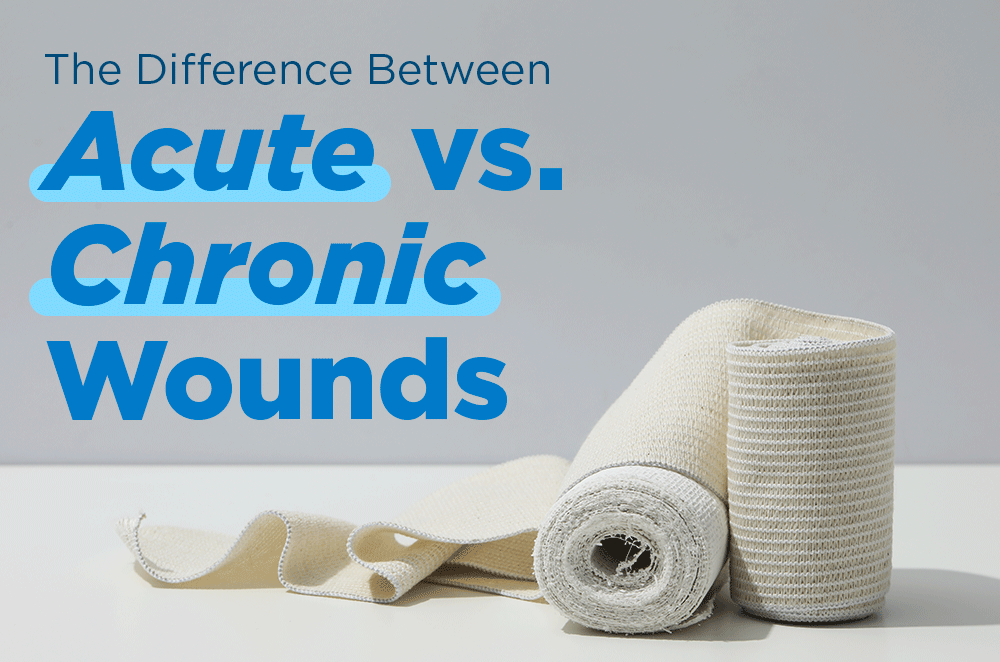It’s Wound Healing Awareness Month, and while we often think about scrapes and cuts that heal up quickly, there’s a whole other category of wounds that stick around for a while – and they need our attention. Specifically, we’re talking about chronic wounds.
You might be wondering, “What exactly is a chronic wound?” Great question! To clarify, let’s break it down.
Chronic vs. Acute
Think about a time you accidentally cut yourself while chopping veggies. It might bleed, you clean it up, maybe put a bandage on it, and within a few days or weeks, it’s pretty much gone. That’s an acute wound. Acute wounds are like the body’s quick responders – they follow a predictable healing process and close up in a timely manner.
In contrast, imagine a wound that just won’t heal. It might be a sore on your foot that’s been there for months, or a pressure ulcer that seems to be getting worse despite care. These are classic examples of chronic wounds.
The simplest way to put it is this:
- Acute Wound: A wound that heals relatively quickly and predictably, usually within a few weeks.
- Chronic Wound: A wound that fails to progress through the normal healing process in an orderly and timely manner, often persisting for months or even years.
Why Won’t My Wound Heal?
This is the big question, right? If our bodies are designed to heal, why do some wounds just get stuck? Often, it’s due to a combination of factors that disrupt the delicate balance needed for repair. Here are some of the main culprits:
Underlying Health Conditions: This is a huge one. Conditions like diabetes, peripheral artery disease (poor circulation), and venous insufficiency (problems with leg veins) can significantly impair the body’s ability to heal. For example, high blood sugar in people with diabetes can damage blood vessels and nerves, making it harder for oxygen and nutrients to reach the wound.
Infection: Wounds that become infected can get stuck in a perpetual cycle of inflammation, preventing new tissue from forming. The bacteria essentially set up shop and prevent healing.
Poor Nutrition: Your body needs building blocks to repair itself. If you’re not getting enough protein, vitamins, and minerals, your wound healing can slow to a crawl.
Pressure and Trauma: For certain types of chronic wounds, like pressure ulcers (bedsores), ongoing pressure on the skin prevents blood flow and can lead to tissue breakdown. Similarly, repeated trauma to a wound can prevent it from closing.
Biofilm: Think of biofilm as a slimy protective layer that bacteria can form within a wound. This layer makes it incredibly difficult for antibiotics and your body’s immune system to clear the infection.
Chronic Wounds Are More Common Than You Think
Chronic wounds are not rare. In fact, they are a significant public health concern.
- Chronic wounds affect 10.5 million U.S. Medicare beneficiaries.
- Chronic wounds impact the quality of life of nearly 2.5% of the total population of the United States.
- According to data collected from The American Journal of Managed Care, this results in $50 billion in annual Medicare costs.
These statistics really underscore the importance of understanding and addressing chronic wounds. They impact millions of lives and can significantly affect a person’s quality of life, leading to pain, decreased mobility, and even limb loss if not properly managed.
What Can We Do?
If you or someone you know has a wound that isn’t healing, don’t just wait it out. It’s crucial to seek professional medical attention. A wound care specialist can assess the wound, identify the underlying causes, and develop a personalized treatment plan. Early intervention can make a huge difference in preventing complications and promoting healing.
We offer specialized wound care through our Center for Wound Care & Hyperbaric Medicine. We provide advanced therapies, including hyperbaric oxygen therapy, for a wide range of complex wounds like diabetic ulcers, pressure ulcers, and surgical wounds that struggle to heal. You can access our services with a physician referral or by calling 580-357-3280. Most insurances, including Medicare, cover the care. You can learn more about our services by visiting the CCMH Wound Care page.
This Wound Healing Awareness Month, let’s spread the word about chronic wounds. Understanding what they are, why they don’t heal, and when to seek help is the first step toward better wound care and healthier lives.
Resources:
https://pubmed.ncbi.nlm.nih.gov/37756368/
Disclaimer:
The Comanche County Memorial Hospital website does not provide specific medical advice for individual cases. Comanche County Memorial Hospital does not endorse any services obtained through information provided on this site, articles on the site or any links on this site.
Use of the information obtained by the Comanche County Memorial Hospital website does not replace medical advice given by a qualified medical provider to meet the medical needs of our readers or others.
While content is frequently updated, medical information changes quickly. Information may be out of date, and/or contain inaccuracies or typographical errors. For questions or concerns, please contact us at contact@ccmhhealth.com.

